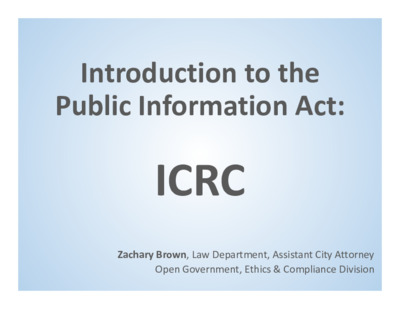Item3B_PIA-ICRC(presentation) — original pdf
Backup

Introduction to the Public Information Act: ICRC Zachary Brown, Law Department, Assistant City Attorney Open Government, Ethics & Compliance Division Chapter 552, Government Code that government is the servant and not the master of the people, it is the policy of this state that “Under the fundamental philosophy of the American constitutional form of representative government that adheres to the principle each person is entitled, unless otherwise expressly provided by law, at all times to complete information about the affairs of government and the official acts of public officials and employees[.]” In Plain English The Texas Public Information Act (PIA) mandates: Information pertaining to the ICRC’s business is subject to the PIA This includes information not stored in City accounts like: text messages, social media posts and interactions, and emails in non‐City accounts When determining whether information is subject to the PIA, it is the context, not the device or account, that matters Retention Therefore, it is important to keep records retention in mind. • Use your City email account for all communications related to the ICRC • If you receive/send ICRC business from a personal account, forward it to your City account (and ask the sender to use your City account in the future) • Same for text messages • Save any other communications or records Public Information Request (“PIR”) In accordance with Texas Public Information Act, the City of Austin has designated the following methods for receiving public information requests. A member of the public may make a written request for public information under the Public Information Act by delivering the request using one of the following methods: ▪ United States mail: P.O. Box 689001, Austin, Texas, 78768-9001. ▪ Electronic mail: public.information@austintexas.gov ▪ Hand delivery: City Hall, 4th Floor, 301 W. 2nd Street; or ▪ City’s online Public Records Center: www.austintexas.gov/pir The City does not accept written requests for public information through facsimile transmission. Your request will not be considered received unless it is sent to the proper address. Responding to a PIR • The City’s PIR Team receives and routes all requests • May ask requestor to clarify or narrow the scope of the request. • Must provide information “promptly” (ASAP) • Or request decision from AG for confidential/excepted information • Work with your staff liaison Law Department’s Role • PIR Team – Processes incoming requests and organizes release of information to requestor. • Open Government, Ethics & Compliance Division – Attorneys will provide legal counsel and prepare OAG ruling requests. Civil Penalties Requestor, county or district attorney, or OAG may file a lawsuit against the City for failure to comply with the PIA. Criminal Penalties It is a misdemeanor offense to refuse to comply with the PIA; distribute confidential information; or willfully conceal, destroy, or alter public information. An offense is punishable by fine or confinement in jail. Training and Resources Texas Government Code 552.012 requires certain public officials to complete training Link to AG training: https://www.texasattorneygeneral.gov/open‐ government/governmental‐bodies/pia‐and‐oma‐ training‐resources/public‐information‐act‐training THANK YOU